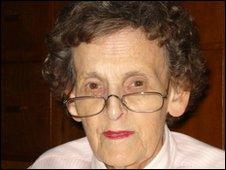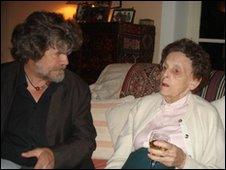Elizabeth Hawley, unrivalled Himalayan record keeper
- Published

In a modest flat in central Kathmandu, a diminutive 86-year-old American journalist operates the Himalayan Database - the nearest thing to an official record of climbs made in the mountains of Nepal.
If a mountaineer wants worldwide recognition that they have reached the summit of some of the most formidable mountains in the world, they will need to get the approval of Elizabeth Hawley.
Part investigator, part librarian, she has been documenting Himalayan climbs since 1963 and has the reputation of being a formidable, sharp-tongued judge.
"I don't mean to frighten people, but maybe I've acquired this aura of being the arbitrator," she says.
"It might scare them into telling me the truth and that might be useful."
Born in 1923 and educated at the University of Michigan, Elizabeth Hawley has been living in Kathmandu since 1960.
She was inspired to move to the Himalayan nation after giving up her job as a researcher for Fortune magazine in New York and visiting Kathmandu on a round-the-world trip.
At that time Nepal had only just opened up to international tourists and was taking its first steps towards democracy, after being a closed country for centuries.
A curiosity
Working briefly as a reporter in Kathmandu for a turbulent few months, Miss Hawley went back to 1950s San Francisco - but not for long - returning to Nepal a few years later as journalist for Time. She has lived in the same flat ever since.

Elizabeth Hawley is friends with many climbers, including Reinhold Messner
At that time Nepalese women were rarely seen in public and a single, foreign woman in her thirties living alone in Kathmandu was regarded as a curiosity.
She found work with the Reuters news agency covering mountaineering news, including the 1963 American expedition that was the first from the US to traverse Mount Everest.
Her close relationship with the US Embassy meant that she could listen to radio dispatches from the climbers, and she was the first to file when they reached the summit.
Over the following years, Elizabeth Hawley reported on all the major Himalayan expeditions, finally taking on the role as the Reuters mountaineering correspondent.
For many years, until this week, she was also New Zealand's honorary consul in Nepal.
She developed close friendships with many of the climbers, including Sir Edmund Hillary and the Italian mountaineer Reinhold Messner.
"I watched that man change," she says of Mr Messner, who was the first climber to scale all 14 peaks over 8,000m.
"He started off a country bumpkin, then slowly over the next few years, he styled his hair. His clothes got more hip and cool."
The two remain close friends to this day.
Deaths
Although she has never climbed a mountain in her life, Miss Hawley says her relationships with climbers have helped her understand what motivates them to keep coming back.
She says the hardest part of her job is recording their deaths.
"You remember them, you mention them in dispatches, you go on," she says.
Although a few climbers have refused to be interviewed by Miss Hawley - one even went as far as to describe her as a senile old woman - most welcome her role as the official recorder of Himalayan climbs.
"The climbers like to be in the database, they like to have their name in print amongst other mountaineers," she says.
She subjects them to a detailed interview, noting facts such as the camps and porters used, the time it took to reach the summit and the exact view from the top.
Only when she is satisfied that climbers have indeed made it to the summit does she record their achievement in the Himalayan Database.
Vital role
She covers all the mountains that fall entirely within Nepal, or on the border with Tibet. She leaves peaks in Pakistan and those entirely within China, to others.
Nepalese climber and mountain guide Dawa Stephen Sherpa says that Miss Hawley plays a vital role in authenticating climbs.
"Although it's the Ministry of Tourism that should be doing this, they're not doing it as strictly as Miss Hawley," he says.
"One of her biggest contributions is keeping the mountaineers honest."
Miss Hawley's investigation into the disputed 2009 ascent of Kangchenjunga by Korea's Oh Eun-Sun - feted as the first woman to have climbed the 14 highest peaks - could have a profound impact on the climber's reputation.
Miss Hawley says that she will continue to mark the climb as disputed unless Miss Oh can give definite proof that she was on the summit.
"I think it's likely that Miss Oh's climb is going to be disputed for the rest of her life," she says.
"I'm sorry that I seem to be the arbitrator of this."
- Published27 August 2010